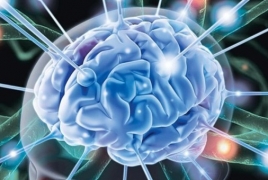Inflammation drives progression of Alzheimer's, research says December 26, 2017 - 12:36 AMT PanARMENIAN.Net - According to a new study by scientists of the German Center for Neurodegenerative Diseases (DZNE) and the University of Bonn now published in the journal Nature, inflammatory mechanisms caused by the brain's immune system drive the progression of Alzheimer's disease, Bio Spectrum reports. These findings provide new insights into pathogenetic mechanisms that are believed to hold potential for tackling Alzheimer's before symptoms manifest. The researchers envision that one day this may lead to new ways of treatment. Further institutions both from Europe and the US also contributed to the current results. Alzheimer's disease is a devastating neurodegenerative condition ultimately leading to dementia. An effective treatment does not yet exist. The disease is associated with the aberrant aggregation of small proteins called "Amyloid-beta" (Abeta) that accumulate in the brain and appear to harm neurons. In recent years, studies revealed that deposits of Abeta, known as "plaques," trigger inflammatory mechanisms by the brain's innate immune system. However, the precise processes that lead to neurodegeneration and progression of pathology have thus far not been fully understood. Prof. Michael Heneka, a senior researcher at the DZNE and Director of the Department of Neurodegenerative Diseases and Gerontopsychiatry at the University of Bonn said, "Deposition and spreading of Abeta pathology likely precede the appearance of clinical symptoms such as memory problems by decades. Therefore, a better understanding of these processes might be a key for novel therapeutic approaches. Such treatments would target Alzheimer's at an early stage, before cognitive deficits manifest.” Previous work by the group that was published in Nature in 2013, had established that the molecular complex NLRP3, which is an innate immune sensor, is activated in brains of Alzheimer's patients and contributes to the pathogenesis of Alzheimer's in the murine model. NLRP3 is a so-called inflammasome that triggers production of highly pro-inflammatory cytokines. Furthermore, upon activation, NLRP3 forms large signaling complexes with the adapter protein ASC, which are called "ASC specks" that can be released from cells. Prof. Eicke Latz, director of the Institute of Innate Immunity and member of the cluster of excellence "ImmunoSensation" at the University of Bonn said, "The release of ASC specks from activated cells has so far only been documented in macrophages and their relevance in disease processes has so far remained a mystery.” In the current study, it was demonstrated that ASC specks are also released from activated immune cells in the brain, the "microglia." Moreover, the findings provide a direct molecular link to classical hallmarks of neurodegeneration. “We found that ASC specks bind to Abeta in the extracellular space and promote aggregation of Abeta, thus directly linking innate immune activation with the progression of pathology," Heneka says. “Additionally, analysis of human brain material indicates at several levels that inflammation and Abeta pathology may interact in a similar fashion in humans. Together our findings suggest that brain inflammation is not just a bystander phenomenon, but a strong contributor to disease progression. Therefore, targeting this immune response will be a novel treatment modality for Alzheimer's”, Heneka added. Authorities said a total of 192 Azerbaijani troops were killed and 511 were wounded during Azerbaijan’s offensive. In 2023, the Azerbaijani government will increase the country’s defense budget by more than 1.1 billion manats ($650 million). The bill, published on Monday, is designed to "eliminate the shortcomings of an unreasonably broad interpretation of the key concept of "compatriot". The earthquake caused a temporary blackout, damaged many buildings and closed a number of rural roads. Partner news |